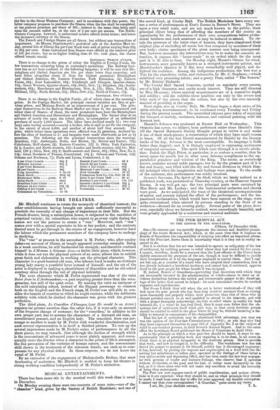MUSICAL ENTERTAINMENTS.
There has been more stir in the musical world this week than is usual in December. On Monday evening there were two concerts of some note,—one of the " chamber" kind, given by the Society of British Musicians; and one of
the sacred kind,. at Crosby Hall. Thelhitish Musicians have every sea- son a series of performances at Erat's Rooms in Berner's Street. They are upon a very small scale, and are not much known to the public; their principal object being that of affording the members of the society an opportunity for the performance of their own compoaitions before profes- sional brethren and such amateurs as may be induced to attend. To ob- tain the presence of the latter class of hearers, they have abandoned their original plan of excluding all music but that composed by members of flair own body; choice specimens of the great masters now being interspersed. But, however necessary the intermixture may be to make the concerts at- tractive, it exposes the " home-made " to an ordeal which for the most part it is ill able to bear. On Monday night, Mozart's Ottetto for wind- instruments, more generally known as a stringed-instrument quintet, and. Mendelssohn's Quartet in E flat, were remarkably well played, and de- lighted the audience. Among the indigenous productions, the best was a Trio for the pianoforte, violin, and violoncello, by Mr. C. Stephens,—which exhibited very promising talent; and a pretty Duet, called " The Return,' by Mr. Brinley Richards. The. Crosby Hall Sacred Concerts, carried on regularly every season, are of a high character, and excite much interest. They are still directed by Miss Mounsey; whose musical acquirements are of a masculine depth and solidity; and she exhibits these qualities not only by the severe and lofty style of the pieces that she selects, but also by her own masterly manner of presiding at the organ. Next night, also at Crosby Hall, Mr. Wilson began a short series of his spirit-stirring entertainments; to be continued every Tuesday and Friday during the present month. The assembled citizens gave token of enjoying the banquet of melody, sentiment, humour, and national painting, with the keenest zest.
Handel's Salomon was produced at Exeter Hall on Wednesday. This- Oratorio has never, we believe, been performed entire since Handel's time till the Sacred Harmonic Society thought proper to revive it and make it one of their stock-pieces; a resurrection of which they have small reason to boast. Of all the bad libretti manufactured for Handel by the literary hacks of his day, Solomon is the most contemptible. Its language is little better than doggrel ; and it is fittingly employed in expressing sentiments of congenial meanness. The spirit which runs through it is servile adula- tion: Zadok the High Priest, in particular, is so zealous a courtier, that he never opens his mouth but to utter some fulsome compliment to the un- paralleled grandeur and wisdom of the King. The music, as everybody knows, contains several noble passages; but by far the greatest part of it is flat and heavy, and filled with the dry and formal divisions in which Han- del indulged when his imagination and feelings were asleep. To the credit of the audience, this performance was coldly received. Severn's Serenata, The Spirit of the Shell, which we lately noticed as s. published work, was performed on Thursday evening, at the Hanover Squaze Rooms. It was well got up: the two principal parts were sustained by Miss Birch and Mr. Lockey; and the instrumental orchestra and chorus were good. As we anticipated, the want of the theatrical accompaniments of action and scenery injured the effect of the performance; and the ira passioned exclamations, which would have been natural on the stage, were quite overstrained when uttered by persons standing in the front of an orchestra—dressed for an evening party. Several parts of the piece, how- ever, especially those we formerly noticed, were exceedingly beautiful, and were greatly applauded by a numerous and musical audience.


































 Previous page
Previous page